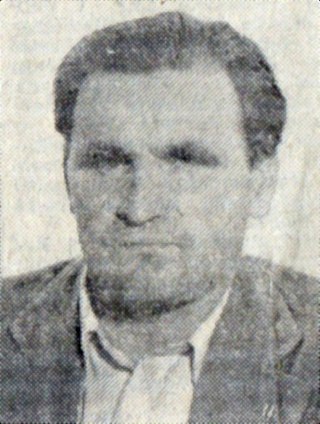Albin Siwak
Polish politician (1933–2019) From Wikipedia, the free encyclopedia
Albin Siwak (January 27, 1933 – April 4, 2019[1]) was a Polish politician, construction worker and a social activist, who acted as a government sponsored antagonist of opposition leader Lech Wałęsa during the 1980s. After his career in the People's Republic, Siwak held nationalist and anti-semitic views, arguing that Solidarity had been a Jewish conspiracy.[2]

Biography
Summarize
Perspective
Son of Józef and Czesława née Mielczarek.[3] He was born in Wołomin. In 1935 he and his family moved to Praga.[3] His father was a member of the Polish Socialist Party, his mother worked as a housewife. He spent World War II and occupation of Poland with his family in Warsaw.[4] After the war, he and his father left for the Recovered Territories, where in the village of Lutry.[5] He completed seven classes of elementary school.
In 1950 he went to Warsaw in search of work. He was directed to the masonry brigade. He quickly became a shock worker and then a foreman.[6] He took part in the construction of Nowa Huta.[7] From the 1950s he was an active activist in trade unions. From 1968 he belonged to the Polish United Workers' Party.[8] He was delegate for the VIII, IX and X Congress of the Polish United Workers' Party. In 1979, the Congress of Trade Unions elected him a member of the World Federation of Trade Unions.
From July 1981 was a member of the Central Committee of the Polish United Workers' Party. From 1981 to 1986 was a member of the Politburo of the Polish United Workers' Party. In the 1980s, he was an opponent and critic of Solidarity movement. From 1986 he was a councilor of the Polish Embassy in Tripoli. Dismissed from his diplomatic position in March 1990 by Foreign Minister Krzysztof Skubiszewski.[9][6][10]
After 1990, he was a member of the Social Democracy of the Republic of Poland. He was removed from the party after a conflict with Leszek Miller. Siwak later joined the Catholic nationalist National Party "Ojczyzna".[11]
Siwak wrote nomerous autobiographic books after retirement, reflecting on his personal journey from mason to diplomat, his political conversion from communist and atheist to nationalist and Catholic, expatiating the socio-political changes in Poland during his lifetime.[12] In 2001, a biopic was released.[13] Towards the end of his life, he aligned with the radical panslavic movement and engaged in bogus archeology.[14] He and his wife had three children.[12]
Publications
- Od łopaty do dyplomaty. Wydawnictwo Projekt, Warszawa 2000. ISBN 83-87168-21-1.
- Rozdarte życie. Wydawnictwo Projekt, Warszawa 2000. ISBN 83-87168-23-8.
- Trwałe ślady. Wydawnictwo Żywe Kamienie, Toruń 2002. ISBN 978-83-913800-2-4.
- Historie niewiarygodnie prawdziwe z zakątka Warmii. Wydawnictwo Regionalista, Olsztyn 2009. ISBN 978-83-927282-3-8
- Bez strachu, tom I, Printed by Europa, 2008.
- Bez strachu, tom II, Warszawa 2009. ISBN 978-83-930071-2-7.
- Bez strachu, tom III, Warszawa 2011. ISBN 978-83-930071-3-4.
- Chciałbym dożyć takich dni, Warszawa 2013. ISBN 978-83-930071-4-1.
- Syndrom gotowanej żaby, Warszawa 2015. ISBN 978-83-930071-1-0.
- Utajniony wyrok, Warszawa 2018. ISBN 978-83-930071-6-5.
References
Wikiwand - on
Seamless Wikipedia browsing. On steroids.
